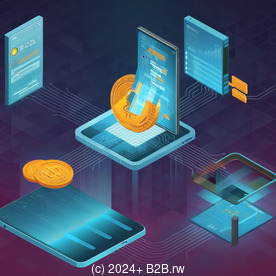
Mobile Payment SDKs: Integrating Adyen Payments in Mobile Apps




Understanding Mobile Payment SDKs
Mobile Payment SDKs (Software Development Kits) are powerful tools that enable developers to integrate comprehensive payment functionalities into mobile applications efficiently. These SDKs come equipped with pre-built components, application programming interfaces (APIs), and libraries that facilitate the addition of diverse payment methods, ranging from credit and debit cards to digital wallets and bank transfers. In the case of Adyen, a leading global payment service provider, these SDKs are tailored to enhance the payment process, ensuring both security and ease of use for consumers and businesses alike.
As mobile commerce continues its meteoric risedriven by the proliferation of smartphones and a significant shift in consumer behaviorhaving effective mobile payment solutions is paramount. Consumers today prioritize convenience and speed in their shopping experiences. Therefore, the integration of Mobile Payment SDKs not only aids in providing a seamless checkout process but is also instrumental in enhancing customer satisfaction and driving loyalty.




The Significance of Mobile Payment SDKs
The relevance of Mobile Payment SDKs extends beyond mere facilitation of transactions. Understanding their significance demands a multi-faceted exploration, encompassing economic, social, technological, and legal perspectives.
Economic Considerations
From an economic standpoint, the advantages of integrating Mobile Payment SDKs can be transformative for businesses. Research consistently shows that streamlined payment processes can enhance sales volumes and dramatically decrease rates of cart abandonment. According to recent industry reports, enhancing the payment experience can increase conversion rates by as much as 30%. In an environment where online competition is fierce, the ability to deliver a hassle-free payment experience can offer a significant competitive edge.
Furthermore, the implementation of efficient Mobile Payment SDKs translates to reduced operational costs associated with transaction processing and chargeback management. Businesses face considerable losses whenever a transaction fails or is disputed; thus, by adopting robust payment solutions, they not only safeguard themselves against fraud but also potentially boost their revenue stream. As mobile commerce is projected to represent nearly 73% of total e-commerce sales in the coming years, exploiting these advanced SDKs is essential for maintaining market relevance.
Political and Legal Perspectives
On a political level, companies deploying Mobile Payment SDKs must navigate a complex landscape of regulations and policies that protect consumers and their sensitive information. Issues of compliance, particularly with the General Data Protection Regulation (GDPR) in the EU and similar data privacy laws in various jurisdictions, require businesses to adopt stringent security measures when handling customer data.
Utilizing Mobile Payment SDKs from established providers like Adyen is pivotal in meeting these legal requirements. Adyens SDKs include encryption protocols, tokenization, and fraud detection mechanisms that ensure compliance. Additionally, this adherence not only mitigates legal risks but significantly enhances customer trusta vital component in fostering brand loyalty and repeat business.
Social Dimension
Social factors significantly influence consumer behavior, and the integration of Mobile Payment SDKs reflects changing patterns in how people prefer to shop. With a growing expectation for choices in payment methodssuch as digital wallets (e.g., Apple Pay, Google Pay) and transparent transaction experiencesbusinesses must adjust to meet these diverse consumer demands.
Insights into demographic shifts reveal that Millennials and Gen Z, who dominate the mobile shopping demographic, are particularly inclined to prefer mobile transactions that are seamless and efficient. Thus, companies that fail to adopt effective Mobile Payment SDKs risk alienating a substantial portion of their customer base, ultimately impacting their bottom line.
Technological Considerations
The technological advancements in mobile payments are reshaping the consumer experience. Innovations such as biometric authentication (e.g., facial recognition, fingerprint scans) and artificial intelligence-driven fraud prevention are increasingly standard elements within Mobile Payment SDKs. These enhancements not only facilitate smoother transactions but also bolster security, which is paramount to gaining consumer confidence.
Adyens Mobile SDK exemplifies these advancements by incorporating machine learning to analyze transaction patterns and flag unusual behavior that might indicate fraud. As a result, this proactive stance not only protects consumers but also maintains the integrity of the merchant's operations.
Environmental and Ethical Aspects
In a world where consumers are increasingly concerned with environmental sustainability, businesses must also consider ethical implications when implementing Mobile Payment solutions. Mobile Payment SDKs allow for integration pathways that can facilitate charitable donations or eco-friendly initiatives right at checkout. By embedding options for responsible consumer choices, brands develop stronger emotional connections with their customers, which can lead to enhanced loyalty and positive brand association.
Moreover, a commitment to sustainability transcends mere marketing strategy; it speaks to a deeper corporate cultural shift that resonates with today's socially conscious consumer base. By aligning payment processes with ethical principles, businesses position themselves as leaders in corporate social responsibility.
Psychological Insights
Understanding the psychological triggers that drive consumer behavior is vital for maximizing the effectiveness of Mobile Payment solutions. A complex or lengthy checkout process can lead to frustration, which frequently results in abandoned shopping carts. Conversely, a streamlined, user-friendly payment experience encourages users to complete transactions swiftly and effortlessly.
Mobile Payment SDKs designed with the user in mind can showcase features such as one-click purchasing, saved payment information, and intuitive interfaces that reduce cognitive load on consumers. These enhancements not only foster positive emotional experiences but also build lasting relationships between consumers and brands.
Examples of Mobile Payment SDKs
To provide a clearer understanding of the competitive landscape of Mobile Payment SDKs, here are notable examples worth considering:
- Adyen Mobile SDK: This comprehensive SDK allows developers to integrate a wide array of payment methods seamlessly into their mobile applications. With features such as customizable user interfaces, robust security protocols, and support for various currencies, Adyens SDK is an ideal solution for businesses looking to scale efficiently.
- Stripe Mobile SDK: Stripe is well-known for its flexibility and user-centric design. The SDK supports numerous payment options, offers an intuitive dashboard for monitoring payments, and provides excellent documentation that helps developers integrate rapidly while maintaining high standards of security.
- Braintree SDK: As a PayPal subsidiary, Braintree emphasizes ease of integration, allowing businesses to accept various payment formsfrom credit cards to PayPalin one seamless solution. Its powerful fraud protection tools and customer-focused features ensure that both the merchant and consumer experience peace of mind during transactions.




Conclusion: Streamlining Mobile Payments with SDKs
The demand for efficient and effective mobile payment solutions is crucial for businesses navigating the modern digital economy. As e-commerce continues to innovate rapidly, the adoption of Mobile Payment SDKs from trusted providers such as Adyen is essential to streamline transaction processes, providing both security and ease for end users.
Mobile Payment SDKs encompass a breadth of features tailored to satisfy a variety of economic, legal, social, and technological challenges, ultimately creating a pathway for sustainable business practices and fostering consumer trust. Companies that recognize the essential nature of these integrations will be well-positioned to thrive as they meet and exceed the expectations of a discerning, tech-savvy customer base.
Enhance Your Mobile App with Our Payment Solutions
Do you want to elevate your mobile application's payment capabilities? Feel free to contact us at www.b2b.rw using email, phone, or through our online form. For those ready to proceed, the price for our Mobile Payment SDK integration service is **$850**. Please make your way to our Checkout Gateway and use our Payment Processor to fulfill the payment of **$850** in favor of our Company. After completing your payment, we kindly ask that you reach out via email, phone, or our site with your payment receipt and relevant details to schedule your Mobile Payment SDK integration service. We appreciate your interest in enhancing your mobile application, and we look forward to assisting you in this exciting journey!
